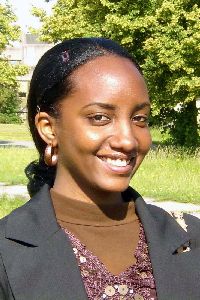Salma Mohamed Abd al-Munim Abdalla

Christians Muslims relations among the Internally Displaced Persons (IDPs) in Khartoum
The work among displaced communities of different faiths opens the opportunity to investigate how displaced persons consider the issues that unite or divide them. In Sudan there is always a tendency to define the Sudanese conflicts along religious lines, with Muslim versus Christian encounters. This thesis explores this relationship at the grassroots level. This research demonstrates that religious faith constitutes no barrier to mutual interaction and in real life neither Islam nor Christianity constitutes ideological cleavages. On the contrary these religions constitute obvious differences in formal circles, namely governmental and administrative levels, as well as in political organizations. Here, at these levels there are barriers between Christianity and Islam and visa versa. Frequently actors in the political and hierarchy of society utilise religion for their own interests. The fundamental research questions though not limited to these are: Is religion the dividing factor in the displaced camps? What are the concerns of displaced people about religious relationships in their daily lives? Do the government and the institutions impose particular behaviour that may be problematic to social interactions in displaced communities?
This research is based on a three month field-work administered in two of the largest Internally Displaced Persons (IDP) camps in Khartoum, Mandella and Wad al Bashir. The camps are cosmopolitan and are a melting point of different cultures and religions. The two study areas emerged in the beginning of 1990s. The reason for displacement for the majority in these two camps was war.
The survey was conducted in form of individual interviews, group interviews and the personal observation in the period from February 27th to May 25th 2007. The researcher used snow-ball sampling because the population is extremely large and scattered over a large geographical area. In total they are 21 individual interviews and three group discussions. The ages of the informants ranged from 17 to 50 years. One way to work in the IDP camps was to reach them through key persons in their communities. Therefore I specifically targeted key persons working in the public committee, university students, local and international NGOs and religious and community leaders. Participants in the survey are both Christians and Muslims. Men and women are alike. All interviews were gender-sensitive to reduce biases. Women are one third of the interviewees.
The displaced people preserve no differences among themselves along religious lines in their daily life. Issues of conflict are at national and government levels. The majority of respondents of both religions agree that religion is used as an instrument of political interests. Other actors such as religious institutions and community members play lesser roles in the use of religion for other purposes.
The study also showed that many Christians identify the Public order as a critical factor in Christian-Muslim relationships in the camps. This is attributed to the police action against IDP camps which is seen discriminatory, other issues related to alcohol drinking, and making, and the way somebody dressing may not necessarily applying to Christians.
Both Christians and Muslims agree on the occurrence of conflicts between Christians and State institutions. The reality is that the Church and the State are frequently at odds with each other over development policy, confiscation of Church properties and demolition of Churches by authorities of Khartoum State under the guise of town planning. It is also noted that the inter-communal violence is potential when a religious property is under the threat of destruction and confiscation. This is the situation when authorities of Khartoum State confiscated Churches and many important parish centres were destroyed inside and outside the IDP camps.
The group discussions observed that there are obstacles towards Christian-Muslim peaceful co-existence. Ignorance is seen to destroy dialogue as it breeds some prejudice about the other group’s religion.
Then this prejudice is in the context of misunderstanding the other’s religious values. There is always suspicion of fear of conversion to Islam by a Christian when he or she walks together with Muslims. Also members of the two religions tend to believe that their religion is the only true believe other’s Religion. Other Social factors that block the dialogue between the groups include politics and ethnicity.
The research has so far revealed that political attitude and behaviour go contrary to the popular trends in inter-faith practice in the camp communities. The analysis of the perceptions about the Christian-Muslim relations at this level is supposed to be valued, promoted and institutionalized by political actors namely the governments and political parties.